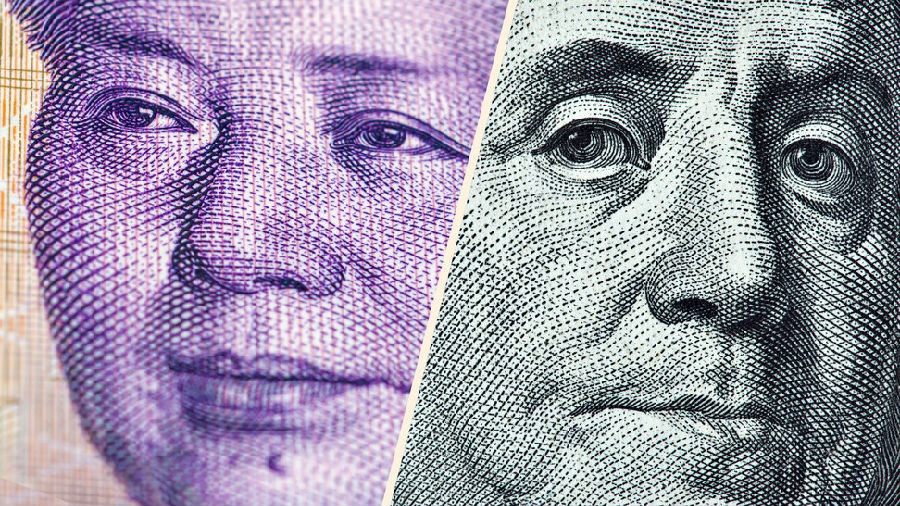(单词翻译:单击)
Tensions between the US and China are so elevated — and the prospect of a trade war between superpowers so grim — that every change in the economic backdrop is significant. So signs that Beijing is successfully containing capital outflows, and preventing its currency from depreciating against the US dollar, are crucial. After all, some of President Donald Trump’s anti-China rhetoric often takes the form of accusations of currency manipulation.
美中关系的紧张程度如此之高——且两个超级大国之间爆发贸易战的前景如此严峻——以至于经济大背景中的每一个变化都意义重大。因此,北京方面正成功遏制资本外流并阻止人民币对美元贬值的迹象至关重要。毕竟,美国总统唐纳德?特朗普(Donald Trump)的一些抨击中国的言论经常以指责中国操纵汇率为形式。
Confounding widespread expectations of a sharp depreciation, the renminbi, China’s currency, has in fact appreciated by 1.2 per cent against the US dollar during the first six weeks of this year, reversing some of the 7 per decline in 2016.
虽然外界普遍预期人民币将出现大幅贬值,但实际上,在今年头6周期间,人民币对美元升值了1.2%,部分逆转了2016年7%的跌幅。
This relative stability has been engineered in part by a crackdown on capital outflows, which resulted in a slight decline in overseas investments by Chinese companies in January after a year of surging cross-border acquisitions. A gentle uplift of interest rates in domestic capital markets has enticed more Chinese money to stay at home rather than seek higher returns abroad.
这种相对稳定部分应归功于中国对资本外流的打击,这方面的行动使得1月份中国企业的海外投资相比此前一年不断高涨的收境并购出现略微下降。国内资本市场的小幅利率上扬吸引了更多中国资金留在国内,而不是到海外寻求更高回报。
Taken together, such measures may suggest that Beijing has been doing what it can to ease US-China trade friction before the expected confirmation of Wilbur Ross, Mr Trump’s choice for commerce secretary. The impression that Beijing may be out to mollify the US administration was underlined by the news this week that China bought $9.1bn in US Treasury debt in December, breaking a six-month streak during which it was a consistent seller.
综合来看,这些措施或许表明,在特朗普的商务部长人选威尔伯?罗斯(Wilbur Ross)获得确认前,中国政府一直在尽可能地缓解美中贸易摩擦。本周的报道称,中国去年12月购买了91亿美元的美国国债,中断了连续6个月对美国国债的抛售。这进一步突显了北京方面可能在尽力安抚特朗普政府的印象。

Of course, these subtle moves may do little to assuage the thumping sentiments expressed during Mr Trump’s campaign, when he accused China of the “greatest theft in the history of the world”, promised to brand Beijing a “currency manipulator,” and said he would slap a 45 per cent tariff on all Chinese exports to the US. In response China has mostly bided its time, though sections of its state-run tabloid media have threatened “tit-for-tat” revenge which would include boycotting US sales of Boeing aircraft, iPhones, soybeans, maize and other products.
当然,这些细微的举动可能无助于平息特朗普在竞选期间表达的义愤情绪,那时他指责中国进行了“世界历史上最大的盗窃”,承诺要给北京贴上“汇率操纵者”的标签,并表示将对所有中国输美商品征收45%的关税。中国的回应基本上是按兵不动——尽管官方小报曾威胁要进行“以牙还牙”的报复,包括抵制美国波音(Boeing)飞机、iPhone、大豆、玉米及其他产品的销售。
Nevertheless, the US administration’s recent form on political issues shows that it is not incapable of retracing rhetorical moves. Mr Trump has backed away from his inflammatory suggestion that he would question the “One China” policy that has underpinned America’s approach to Taiwan since the normalisation of relations between the People’s Republic of China and the US in the 1970s.
然而,特朗普政府近期在政治问题上的所作所为表明,它并非不能收回说出的话。特朗普已不再坚持其质疑“一个中国”政策的煽动性暗示。自上世纪70年代中华人民共和国与美国关系正常化以来,“一个中国”政策一直是美国对台政策的基础。
In recent weeks the White House also seems to have tacked back to a more moderate position on China’s provocative island-building in the South China Sea. Early comments by Rex Tillerson, the new US secretary of state, had implied that the US might be contemplating a naval blockade of these artificial islands. This position has been diluted, easing concerns over a potential military clash.
最近几周白宫对中国在南中国海挑衅性造岛工程的态度似乎又回到了更温和的立场。新任国务卿雷克斯?蒂勒森(Rex Tillerson)先前的言论暗示,美国可能在考虑对这些人工岛进行海上封锁。如今这一立场有所淡化,缓解了人们对潜在军事冲突的担忧。
Against this background, China’s decision to avoid antagonising Washington on trade issues seems sensible. With 18 per cent of Chinese exports going to the US and some 20m Chinese employed in making the things that Americans buy, Beijing would be foolish to ignore the blow its economy would sustain in a trans-Pacific trade war. Keeping the renminbi stable may largely be in China’s own interests as well. The government is struggling to curb capital outflows that last year ran to several hundreds of billions of US dollars. It appears to have decided that as long as its citizens believe the renminbi will stay strong, they are less likely to spirit their money overseas. For now, cool heads have prevailed and that is to be welcomed.
在这一背景下,中国决定避免在贸易问题上与美国对抗似乎是明智的。中国出口商品18%销往美国,约有2000万中国人的工作是生产美国人购买的商品,北京如果无视其经济在一场跨太平洋贸易战中可能遭受的打击,将是愚蠢的。维持人民币稳定或许在很大程度上也符合中国自己的利益。中国政府正竭力遏制资本外流,去年流出达到几千亿美元。中国政府似乎已决定,只要国民相信人民币将保持坚挺,他们就不太可能把自己的资金转往海外。就目前而言,冷静的头脑占了上风,这是可喜的。


